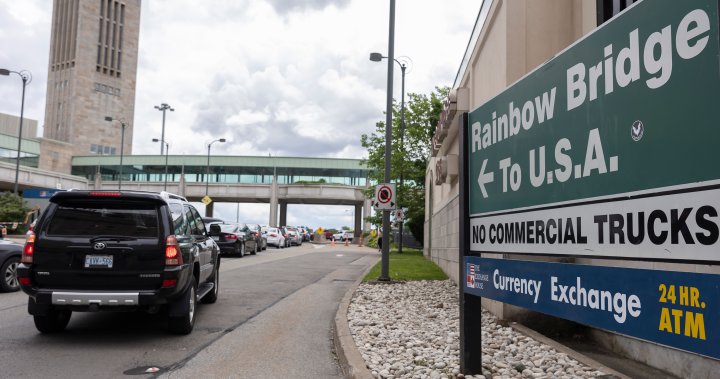Jobs
Concerns mount ahead of possible job action at Canadian borders | CBC News

Timarie Marentette is concerned about the potential for long delays at the Canada-U.S. border due to job action — which could start as soon as Friday afternoon unless a deal is reached.
The Windsor, Ont., resident normally crosses the border five days a week for her job as an automotive engineer at Ford in Michigan.
“It’s not going to be great,” she said.
“It’s already pretty slow at the border, I find a lot of days. It’s going to be tough.”
Roughly 9,000 Canada Border Services Agency (CBSA) workers will be in a legal strike position at 4 p.m. ET on Friday.
The agency — which falls under the umbrella of the federal government’s Treasury Board — has been in mediated talks with the Public Service Alliance of Canada (PSAC)-affiliated Customs and Immigration Union (CIU) since Monday. The union voted 96 per cent in favour of job action in May after two years without a deal.
The CIU says there are no updates regarding talks at this time because mediation is ongoing.
“We are still hopeful an agreement can be reached but the clock is ticking if the government wants to avoid any potential delays at Canada’s borders,” said CIU spokesperson Pierre St-Jacques.
Because most CBSA employees are essential workers, work-to-rule is a strong possibility, according to some experts.
“A strike can take many forms and we’ll see what happens this round. The union leadership will decide on how to proceed based on how things evolve,” said St-Jacques.

Officers ‘cannot intentionally slow down border processing’
A CBSA spokesperson says borders and ports of entry will remain open and safe — with 90 per cent of its frontline officers considered essential workers.
“Per the Federal Public Sector Labour Relations Act, employees in essential services positions must provide uninterrupted border services,” said Luke Reimer in a statement.
“They cannot intentionally slow down border processing,” Reimer said, citing federal public sector labour relations law.
“The CBSA is monitoring the situation closely. We are committed to working quickly to address any impacts and we will keep the public informed through our website and social media channels.”

Phil Steuer is a freelance sound engineer who works out of a recording studio just outside of Detroit.
He says the job action would be another thorn in his side for his daily commute.
“It’s already enough to navigate busy times and events in Detroit — which is normal, I was ready for that. Another problem, another thing to navigate.”
Steuer says being late for a studio session could cost him and result in a whole day’s worth of work lost.
“I have something lined up tomorrow with a sound company to help them set up for an event. I planned on leaving a little earlier, just in case I ran into any issues. It’s something that I can’t be late for. Or else I get docked pay.

Steuer said the potential delays wouldn’t be enough of an aggravation for him to support the idea of the government intervening in job action through back-to-work legislation.
“Does it cause a headache for me? Sure,” he said. “But I can understand why it’s happening.”
If it comes to it, Marentette said, she’s also not in favour of back-to-work legislation — yet.
“At this point, no, but maybe after a couple weeks of slowdowns, I might be a little bit more supportive of back to work legislation,” she said.
MP weighs in on talks
Windsor—Tecumseh MP Irek Kusmierczyk says he’s confident a deal will get done “that’s fair.”
“Border officers are absolutely vital to this community,” he said.
“They’re important. They’re also our neighbours. They work and live here.”
He says whether it’s morning, noon, night or on the weekend, all sides need to remain at the bargaining table to get an agreement over the finish line.
“We know the importance of that border. We know that one third of trade goes through this region. $400 million every single day.”
According to Kusmierczyk, his government’s goal is to ensure any border interruption is “absolutely minimized” because of the importance of free flowing goods, people and services.
Industry worried about possible impact
The Canadian Manufacturers and Exporters (CME) says a work-to-rule type situation at the border could significantly impact manufacturers of all sizes across the country — for both imports and exports.
Dennis Darby, CME president and CEO, says it would hinder commercial traffic and business travel for the industry.
“Once again, manufacturers are being held hostage from circumstances outside their control,” said Darby.
“Labour-related disruptions impacting the transport of goods are no longer the exception and becoming the rule. We need the federal government to take a proactive approach to preventing these disruptions and protecting manufacturing access to critical supply chain infrastructure.”
The chamber of commerce for the Windsor-Essex, Ont., region says it has reached out to all parties involved in the negotiations.
Rakesh Naidu, president and CEO, says local businesses will suffer because of any job action.
“Businesses that rely on a smooth and timely flow of cross-border goods and services could face significant challenges from this job action, including the automotive sector, which is heavily dependent on ‘just-in-time’ logistics,” he said.










